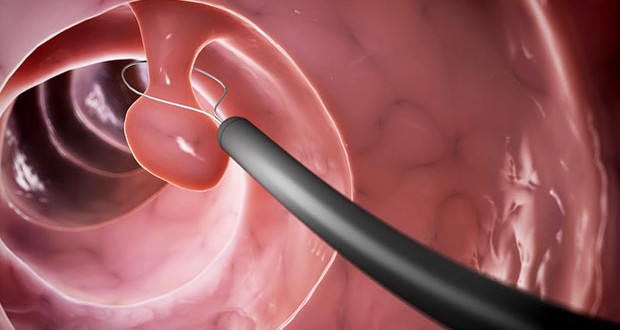Illustration is of a 3D-rendered illustration of a polyp removal. Photo credit: © Can Stock Photo Inc. / Eraxion.
By Allan Bucka Jones
PRIDE Health Columnist
If you have a family history of colorectal or colon cancer, or concerned about the disease, you will want to do everything you can to protect yourself. Research has shown proper diet can reduce the possibility of colorectal or colon cancer showing up.
Past research has found that diets high in red meat may increase the risk of colorectal or colon cancer, while high-fiber diets may decrease the risk. Logic suggests that vegetarian diets, which tend to be meatless or low in meat and high in fiber, would be beneficial. Research published May 2015 in JAMA Internal Medicine has found support for that idea.
To evaluate the association between a vegetarian diet and colorectal cancer, researchers examined data on 77,659 Seventh-day Adventists, many of whom are vegetarian at some level, (vegan, lacto-ovo vegetarian, pesco-vegetarian or semi-vegetarian).
Over the course of about seven years, colorectal cancer was diagnosed in 490 of the research population, but less in vegetarians, particularly pesco-vegetarians, whose diets include fish. The researchers concluded that vegetarian diets of all sorts were associated with a decreased risk of colorectal cancer.
Vegetarian diets are associated with a number of health benefits, including healthy body weight, less hypertension and reduced risk of diabetes. Reduced risk of colorectal cancer may be another reason to consider vegetarianism, particularly if eating fish on occasion makes it more palatable.
Diet intervention alone is not considered powerful enough to prevent colorectal cancer in high-risk patients. A good screening regimen, ideally with regular colonoscopy, is the best defense.
 Our gut, or intestine, starts at the mouth and ends at our anus. The colon which is prone to cancer, is a part of the large intestine, and is about 6 feet long in an adult.
Our gut, or intestine, starts at the mouth and ends at our anus. The colon which is prone to cancer, is a part of the large intestine, and is about 6 feet long in an adult.
The large intestine is the main site for cancer development, and so it is recommended that by age 45 we should consider having a doctor view the inside of the large intestine. Colorectal or colon cancer screening, using the colonoscopy test, is recommended once every 5 to 10 years. Your doctor will be able to tell you the frequency based on your risks for developing the cancer.
Colorectal, colon or bowel cancer can be detected in the large intestine. This cancer is 90% preventable if detected early, seeing that the start of the cancer in a colon lining projection or polyp, can be stopped once the polyp is removed.
Some of the risk factors for colon or colorectal cancer are, a diet rich in red or processed meat; type 2 diabetes or a family history of diabetes; personal history of chronic inflammatory bowel disease; age (as you get older the risk increases); excessive drinking of alcohol; obesity; physical inactivity; smoking; previous cancer elsewhere in the body.
Signs of colorectal or colon cancer include: detecting bleeding in and around the stool (it is very important to look at, and examine, your stool after each bowel movement); have you experienced a change in your bowel habits? Are you more constipated? Do you have a loss of weight for unknown reason? Abdominal pain? Cramping? Bloating? Fatigue? Weakness? Straining to pass your stool? Narrowed stool? These are all signs of possible colorectal or colon cancer, or some other problem, and requires a look inside your intestine. This can be achieved by doing a colonoscopy.
Colonoscopy is one of a number of tests that may be used to screen for colorectal or colon cancer. Another test, the faecal occult blood (FOB) test, detects small amounts of blood in your faeces which you would normally not see or be aware of. Another process, a barium enema, is a way to detect colon or colorectal cancer.
It involves taking X-rays of the colon and the rectum after the patient is given an enema with a white, chalky liquid containing barium. The barium outlines the large intestines on the X-rays. Tumors and other abnormalities appear as dark areas. Which screening test is used depends on your risk, your preference, and your doctor. Talk to your doctor about what puts you at risk and what test is best for you.
A recommended diet for good colon health should include antioxidants, folic acid, calcium, vitamin D, high fibre and low fat. Aim for a diet without processed foods, but rich in unprocessed fresh food.
The ability to conquer colorectal or colon cancer is under your control. Talk to your doctor or healthcare provider, and make the move today to live a healthy and fulfilling life.
Allan Bucka Jones is a Health Promoter and Broadcaster. You can contact Allan Bucka Jones at allan@jonesandjones.ca
 Pride News Canada's Leader In African Canadian & Caribbean News, Views & Lifestyle
Pride News Canada's Leader In African Canadian & Caribbean News, Views & Lifestyle





